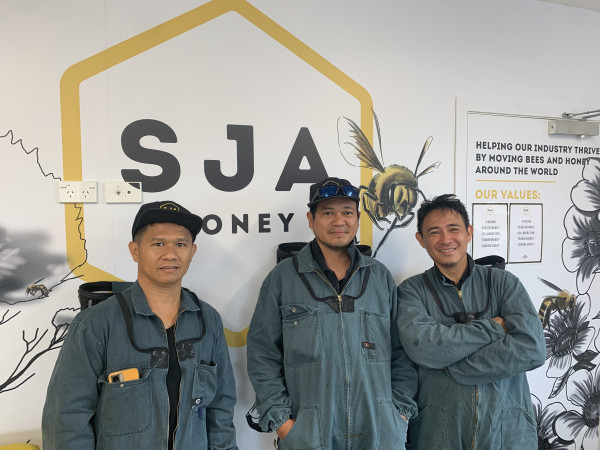Developing people capability key to successful commercial bee operation
12 February 2024
A culture centred around developing people and providing opportunities has helped grow S J Apiaries from a backyard business with a few hives to a large commercial bee operation.
Based in the Rodney district north of Auckland, S J Apiaries (SJA) is a commercial bee operation which supplies live queen and packaged bees to beekeepers in New Zealand and Canada, has queen rearing and pollination operations, and hives across the Kaipara district.

SJA Apprentices (from left): Reyali Matito, Jaymarch Casido and Welbert Archide.
The business began 15 years ago in the backyard of Managing Director Jason Marshall. Since then, it’s grown into a large and diverse business, dedicated to servicing the commercial bee industry.
Jason says growing to a large operation required a people-centred approach and part of that is offering training opportunities. Offering staff the opportunity to train on-the-job and gain qualifications for their future is part of building and looking after the team, he says.
Growing people and skills through training
Currently six SJA beekeepers are studying either Level 3 or Level 4 of the New Zealand Apprenticeship in Apiculture with Primary ITO. The 20-month programme covers the fundamentals of beekeeping and managing a business and includes on-going training support and an annual block course.
Having training available helps attract workers and part of the SJA recruitment process, says Jason.
After three months new recruits who meet the company’s criteria are offered training or apprenticeship opportunities.
Learners and employers are supported by a Primary ITO Training Advisor with regular contact and site visits to discuss the work and plan future modules. A learning support team and mentors are available to learners who require additional support.
Martina Balasova is the Training Advisor supporting SJA, and says the company takes time out to train learners and is invested in its staff doing well.
Training results in high staff retention
Jason says having team members continue to learn as they work fits with the company’s plan to develop a positive and rewarding workplace.
Since the business started it has always had beekeepers undertaking industry training on the job. Jason says this means staff retention is high, with those who have completed work-based training in particular staying with the company for many years.
Another positive aspect of the training is that the regular sessions provide a time and space for information sharing and planning which is helpful for the whole team.
“It gives us the opportunity to focus on what we do, why we are doing it, what are the different ways this could be done, and what this is leading too.”
Regular learning sessions support business
The learning sessions also allow the team to discuss challenges that arise, and problem solve them in an open environment. “We try to have a culture where it is ok to speak up and challenge what we are doing, and this training supports that.”
Looking to the future Jason says SJA will continue to offer work-based training to new trainees who show potential and an interest to stay in the industry.
Beekeepers relish training opportunity
Three SJA employees taking the New Zealand Apprenticeship in Apiculture are enjoying learning new skills and thankful for the collaboration between their employer and Primary ITO that has given them the opportunity.
A sting by a bee was the catalyst to Welbert Archide beginning a career in beekeeping, which has since turned into his passion.
Because he didn’t get an allergic reaction, Welbert was inspired to consider working with bees, and later began studying pollination at the Department of Agriculture in his home country the Philippines, before finding work in beekeeping in Saudi Arabia.
In 2015 he moved to New Zealand to work at S J Apiaries and enjoying work-based training. Welbert “It is great to have the opportunity to learn new ways of doing things and refresh your knowledge.” The qualification will also recognise his existing skills and could provide opportunities for more responsibility, he says.
Beekeeper and Queen breeder and mum Mel Griffiths loves her job and after eight years working in a range of roles at S J Apiaries, is rapt to be working toward her first ever qualification.
Mel has started Level 4 which covers beekeeping management, disease, and food safety, and says she is particularly enjoying further learning on flowers and soils.
Mel encourages anyone coming into the industry to do work-based training. “It is good to do alongside what you are learning on the job. It advances your progress and gives you the paperwork to back up your work.”
Queen beekeeper Reyali Matito began his career working with native honeybees in his home country the Philippines after leaving school, later moving to Qatar for three years to broaden his experience.
After learning queen breeding he looked for opportunities overseas, and, on the recommendation of friends in the industry, came to work at SJA in 2018.
He says learning toward the apprenticeship has given him new skills for his role and the confidence that he’s meeting New Zealand standards. “It is really helpful with regard to taking care of the hives and learning how to do big extractions which we did not do in the Philippines and Qatar.”
For more information about apiculture programmes, and how you could get up to 50% off fees for 2024, contact us.
